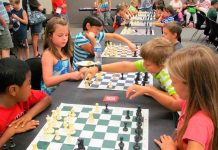МБОУ СОШ №5 им. В. И. Данильченко
Краснодарского края, Каневского района
станицы Стародеревянковской
Тест по чтению.
подготовила
учитель английского языка
Тишакова Валентина Федоровна.
2012
Пояснительная записка.
Предлагаемый вариант проверочной работы проводится в 9 классе. Работа с текстом вызывает интерес, концентрирует внимание, содействует усвоению и закреплению структур английского языка.
Цель: Помочь овладеть живым разговорным языком.
Задачи: 1. Расширять словарный запас.
2. Развивать навыки устной речи.
3. Развивать внимательность при чтении текста.
4. Развивать интерес к изучению английского языка.
THE DRAGONFLY AND THE BEE
The Bee and the Dragonfly went to school1 in the forest. Although they used to sit at the same desk, they were not friends. Even in break they played separately.
One day the Bee caught a cold2 and didn’t come to school.
«It’s nothing much,»3 they said in class. «It doesn’t matter if she misses a day or two. The Bee always gets good marks and she will catch up.»4
So the children insects said they were sorry their friend was ill, and that was that.5 Only the Dragonfly couldn’t stop worrying. She sat there looking very miserable, rubbing her eyes, and then she began to cry.
«Oh, oh,» she wept. «If only little Bee could get well again quickly, How shall I get on without her?»6
«Just look!» the Mosquito exclaimed. «Who would have thought that giggling Dragonfly could be such good friends with7 anybody?»
And nobody knew what a good reason8 the Dragonfly had for crying. She used to copy her homework from the Bee.
I. Answer the following questions:
1. What school did the Bee and the Dragonfly go to?
2. Who went to school in the forest?
3. Used the Bee and the Dragonfly to sit at the same desk or at different desks?
4. Were the Bee and the Dragonfly good friends?
5. Did they play in break together or separately?
6. How did they play in break?
7. Did the Bee or the Dragonfly catch a cold one day?
8. What happened to the Bee one day?
9. What did they say in class?
10. Did the Bee get good or bad marks?
11. Did it matter if the Bee missed a day or two?
12. What did the children insects say?
13. Did the children insects worry about the Bee?
14. Why did they not worry about her?
15. Who was the only pupil that could not stop worrying?
16. What did the Dragonfly do?
17, What did the Dragonfly say wiping?
18. Why was the Mosquito so very much surprised?
19, Did the Dragonfly have a good reason for crying?
20. What reason for crying did the Dragonfly have?
21. Used the Dragonfly to copy her homework from the Bee or from the Mosquito?
22. Why was the Dragonfly so upset?
II. Replace the italicized parts of the sentences by words and phrases from the text:
1. All the children insects attended school in the forest.
2. The Bee and the Dragonfly never played together.
3. The Bee fell ill and missed a couple of days.
4. It will be easy for her to learn everything the class learned during her absence because she is a very good pupil.
5. The Dragonfly who always sat at the same desk with the Bee kept worrying about her neighbor and looked very unhappy.
6. The poor thing cried and said: «If only little Bee could recover quickly. How shall I manage without her?»
7. The Dragonfly was so unhappy about the Bee’s absence because she always copied her homework from her.
III. Find in the text English equivalents for the following and use them in sentences of your own:
жалкий (несчастный), хихикать, рыдать, учиться я школе, пропускать (уроки), догонять, это неважно, поправиться, обходиться (без), основательная причина списывать у кого-либо, простудиться, дружить (с).
IV. Retell the story using the following words and phrases:
to go to school, used to sit, to catch a cold, it’s nothing much, to miss a day or two, to get good marks, to catch up with, that was that, couldn’t stop worrying, to look miserable, to rub one’s eyes, if only, to get well, to get on without, who would have thought, to be good friends with, to have a good reason for, to copy from.
Список использованной литературы
-
О. В. Афанасьева, И. В. Михеева, Английский язык, Учебник для 9 класса общеобразовательных учреждений ,Дрофа Москва 2010 год
-
К. И. Кауфман, М. Ю. Кауфман, Английский язык, Учебник для 9 класса общеобразовательных учреждений, из-во Титул 2010 год
http:// tutor. do. am/ load/ domashnee_ chtenie/ the_ dragonfly_ and_ the_ bee/6-1-0-32
1 school—no article is used when the word means lessons, the process of being educated, e.g. He is too young to go to school. At what time does school begin? The children played in the yard after school. She always repeats her homework before school. The same rule applies to the nouns college, hospital, prison, court, bed, table, etc. when they are used as abstract nouns, e.g. She is at college. He was taken to hospital (prison). The family were at table. It’s time to go to bed.
2 to catch (have) a cold — Russ. — простудиться, e.g. 1) She caught a bad cold yesterday. 2) The weather was wet and many students were absent with colds.
3 It s nothing much (coll.) — It doesn’t matter much. It’s nothing to worry about (Russ. — неважно, нестрашно).
4 to catch up (with) — here to learn everything the class learnt during the absence of the pupil (student); e.g. She is a good student and will easily catch up with the group in a couple of days. Syn. to overtake.
5 that was that—that was all
6 to get on without—manage without (Russ.— обходиться), e.g. It’s difficult to get on without things one is used to.
7 to be good friends with—to be friendly toward, to be on friendly terms with, e.g. She is good friends with everybody in the group.
8 a good reason — Russ. — основательная причина





